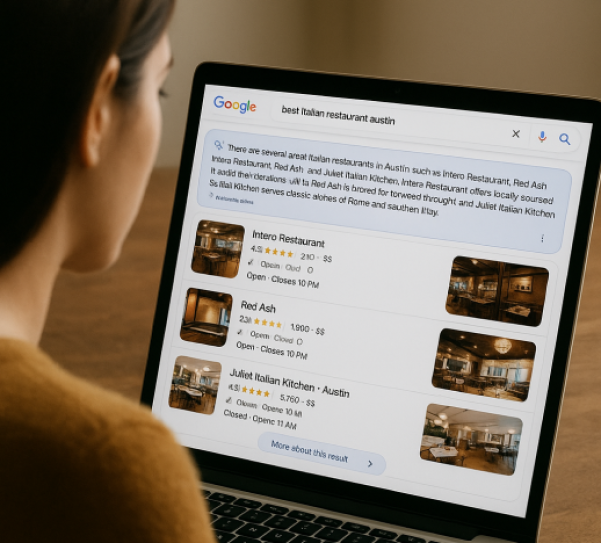
AI tools like ChatGPT and Google’s new AI Overviews don’t care so much about your website anymore — they’ll send prospects elsewhere if you’re not optimized their way. Local businesses that don’t start adapting will disappear.
In my last blog post I wrote about how the search engine game is changing fast. And I mean fast. If you're still thinking in terms of ranking #1 on Google and counting clicks, you’re already falling behind. The rise of AI-driven search tools — ChatGPT, Bing Copilot, Perplexity, and Google’s own AI Overviews — is flipping the traditional SEO playbook on its head.
People aren’t clicking like they used to. They’re asking questions and getting answers — directly from AI. Your website might be the source of those answers, but the user may never visit it. If you're not adapting to that reality, you're already losing business you don’t even know you're missing.
Let’s take a deeper dive into what’s happening, and what local businesses like yours should do about it.
Search Isn’t Just Search Anymore
A few years ago, someone would type “best plumber near me” into Google, scan the results, and click through to a few websites. It worked great then, but that’s not how it works anymore.
Now they ask an AI system like ChatGPT. Or they type their question into Bing, which uses GPT-4 itself to provide answers. Or they get a summary box on the top of Google search results page — called an “AI Overview” — that pulls from multiple sources and answers the question without them ever needing to visit your site.
Here’s what the data says:
Google’s AI Overviews now show up in about 47% of search queries.
Organic (search) traffic for websites in categories like health, finance, and how-to content has dropped anywhere from 18% to 64% since AI answers started showing up.
HubSpot and other large platforms have reported double-digit traffic losses from these changes.
Bottom line: users are getting more of what they need without clicking. And if your content isn’t feeding those answers, you’re becoming invisible.
What This Means for Local Businesses
This isn’t just a problem for bloggers or national brands. Local businesses are already seeing this play out.
Voice search, AI assistants, and mobile AI tools are becoming the first stop for people looking for services nearby.
Consumers are starting to trust AI answers just as much (or more) than Google reviews or map listings.
If your business isn’t showing up in these AI-driven results, you're losing potential customers before they even see your name.
The old SEO rule was “rank high.” The new rule is simple: be the answer.
How to Adapt Without Losing Your Mind
Listen, you don’t need to chase every new AI platform or rewire your entire business. But you do need to tighten up your local visibility and structure your content for the new way people find answers.
Here’s what to focus on:
1. Structure Your Website for AI
AI pulls answers from content that’s clean, clear, and well-structured. Make sure your site includes:
Frequently asked questions written in plain language.
Bullet points and short answers to common problems you solve.
Schema markup (your web person will know what that is — it helps AI understand what’s on the page).
Clean page titles, headers, and alt text.
Make it easy for AI to quote you.
2. Get Hyperlocal
Generic search terms are saturated. Focus on specifics:
“Best estate planner in Alamo Heights” is more useful than “estate planner near me.”
Use neighborhood names, landmarks, or zip codes in your content.
Show local expertise — mention community events, local laws, or regional tips where appropriate.
AI favors relevance. Localized content helps you win that game.
3. Optimize Your Business Profiles
Google Business Profile is still your frontline asset. But other places matter now too:
Yelp, Apple Maps, and Bing Places
Industry directories
Review platforms
Make sure all your info is accurate, consistent, and includes keywords related to what you do.
And if you haven’t asked your happy customers for reviews lately, now’s the time. Those reviews feed AI answers, too.
4. Build Content AI Can’t Summarize
Some content will always be hard for AI to summarize. That’s a good thing.
Case studies, before/after stories, personal insights
Video content
Hyper-specific local guides
Unique takes on common problems
Use this type of content to show expertise and keep visitors engaged longer when they do click.
5. Track What Matters Now
Organic search traffic will keep dropping. That doesn’t necessarily mean you’re failing, though.
Start measuring:
Calls from your website
Form submissions
Bookings
Directions clicks from your business listing
These are the actions that drive revenue, not just visits.
The New SEO Rule: Be the Answer
Here’s the hard truth: your website may not be the destination anymore. It’s the source. And the businesses that show up in AI results — whether that’s a chat window, a map, or a summary box — are the ones getting the call.
SEO isn’t dead. It’s just spreading out across a dozen different surfaces. And the ones who adapt most quickly to this changing landscape will have a massive advantage.
So if you’re still optimizing for clicks, you’re playing last year’s game.
It’s time to optimize for findability — everywhere.
Need help with your digital marketing? Get on my calendar for a free 30-minute consultation.

 Add Row
Add Row  Add
Add 




Write A Comment